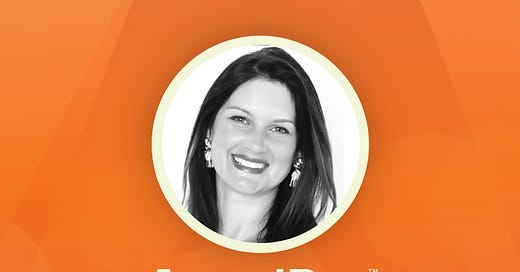You’re invited to join a confidential discussion on Working Effectively with Legal Recruiters. More events to accelerate your career are coming soon.
Welcome to AccelPro IP Law, where we provide expert interviews and coaching to accelerate your professional development. This interview is part of our AccelPro Career Tools series, where we explore topics including wellness and client relationship management. Our host is internationally recognized journalist, author and NPR host Celeste Headlee. Today we’re featuring a conversation with Tara Antonipillai, Founder & Principal at Cultivate.
We discuss the detrimental effects of a lack of connection in the workplace, including anxiety, substance abuse, burnout, etc., and how this widespread issue has sharply increased with the recent rise of remote work. The lack of physical workspaces has left many, especially those who started their careers during the pandemic, isolated and dissatisfied with their jobs.
Tara offers advice on how small, sustained behavioral changes are the best way to improve these kinds of environments. Something as simple as picking up the phone to call a coworker—and avoiding Zoom fatigue—can help a team become healthier and more connected.
Listen on Apple Podcasts, Spotify and YouTube.
Interview References:
Tara Antonipillai’s Cultivate profile.
4:57 | The power and prevalence of loneliness. (2017, January 13). Harvard Health Publishing. Harvard Medical School.
4:57 | Social isolation and loneliness add up to higher heart risks. (2022, June 1). Harvard Health Publishing. Harvard Medical School.
TRANSCRIPT
I. THE STRUGGLE TO CONNECT IN A DIGITAL WORKPLACE
Celeste Headlee, Host: We were in a global loneliness crisis, according to the WHO, before the pandemic began. I can only imagine that has gotten worse. Can we start by defining loneliness in the workplace? Loneliness in our personal lives means a gap between how much contact and intimacy we want and how much we're getting. It doesn't necessarily tie back to how many people we're interacting with. So what does that mean when it gets to the office?
Tara Antonipillai: It translates into something I think very similar in the workplace, with some slight differences. Basically, the research shows that, for example, people who have a best friend at work have higher wellbeing in terms of mental health, in terms of physical health and also in terms of job satisfaction. That's how I would define one element.
The other element is the leadership component. We know that leaders impact the wellbeing and the happiness, to use a colloquial term, of people in the workplace often more than even their spouse does, more than their therapist or their doctor does. That’s who you're spending time with, so if you have a connection with that person that also contributes or detracts from how connected or lonely you feel.
And then the final element I think, which is a little bit unique, about work is this idea of what researchers call high quality connections. That you don't necessarily have to have an intimate relationship with someone to have less loneliness or be in a meaningful relationship. For example, are there people at work who support you? They call it task enabling in the research, but really it is someone who's like a coach, someone who helps you along, supports you, brings out the best in you. Someone who treats you respectfully; that's another marker.
And then the final marker is actually play. Do you have a sense of playfulness at work? And those elements can be in a passing interaction with someone. They don't necessarily have to be a best friend or someone you work with all the time.
CH: There have been a lot of warnings from medical professionals to take loneliness seriously. I've read some studies saying that loneliness can be as bad for your health as smoking a pack of cigarettes a day. Why don't we take loneliness seriously as a health threat?
TA: That's hard for me to answer generally. I think largely those statistics have been borne out in many longitudinal studies. Two generations of studies at Harvard that followed people throughout their lifetime basically said loneliness is more impactful than high blood pressure, more impactful than smoking.
I think it's also more amorphous. If someone dies, you might say they died of a broken heart, but you can't really trace it back. I think it's less clear and it has an impact on people's health throughout their life. I think what we're seeing in the pandemic too, and what studies are starting to show is that loneliness, that lack of attachment, amped up other risk factors. It amped up things like anxiety, it amped up things like mental health challenges. It amped up things like alcohol use disorders, substance use disorders, and I think they're just starting to tie those things together, but it's complex.
CH: There's also a difficulty, especially for leaders, in helping to address this because sometimes the shame of admitting, “I'm lonely” prevents people from getting help. Is that true?
TA: I work in the legal industry where we're a bit behind what some other industries are doing. But I think we definitely are making strides. But there is a certain amount of shame, and maybe it's not seen as a legitimate or as a real health or workplace issue when in fact, I think it's probably one of the most important ones.
The other thing I'll say, and this is a drum that I beat a lot, is that the same issues that employees are having, leaders also often have those same issues, and that is a complicating factor in terms of who to rely on when you have a whole generation of people experiencing the same thing.
CH: So who is being affected the most? Is there a category, especially in the legal profession, that is the most affected by loneliness?
TA: I don't know that there are good statistics on that, but I can tell you what I see. People who came out of law school right before the pandemic, during the pandemic—those folks, I think, have really struggled to integrate themselves into wherever they're working.
And in the case of a firm, they're often working remotely or in a hybrid setting. They're getting their assignments by email. They're getting feedback by email. There is not a lot of interaction, even just casual interaction, with their peers. That's where I see the biggest gap because some of the people who are further along in their career, they have different relationships. They’re not living in an apartment by themselves. They're living in a home with family members. They had pre-existing relationships in their workplaces. So, I think those younger people probably have the hardest side of it.
—
II. HOW TO HELP YOURSELF AND YOUR TEAM COMBAT LONELINESS
CH: This is difficult for a leader if you're trying to help your team. And especially with the new research we have showing that video conferencing, for example, is an extra cognitive strain. How do we mitigate this? What kind of skills could a leader be focusing on to help people if they're suffering through loneliness?
TA: We have to approach this globally, not in terms of “this is an individual problem,” but in terms of “this is going to be a long-term problem if we don't address it.”
One is that there's a lot that's lost in email and a lot that's gained by the telephone.
CH: Wait, did you say telephone?
TA: The regular old phone. I think it's great for clarifying. It's also more likely that you have that kind of high-quality connection and interaction that I was talking about before. Maybe it's asking someone a question about what they did over the weekend, maybe it's asking someone about their pet, or their children, or their vacation. But you have some type of interaction that goes beyond just an email with instructions.
CH: I wonder if the type of skills that are required of leaders right now may be different than the type of leadership skills that were either modeled to them, or even that they were trained in, when they were coming up. The type of tough love that many people were trained in as leaders is not often what many leadership consultants are advising now.
TA: I think that's true. And in this space it's even a bit more complicated, because it’s an apprentice model where you learn from watching someone else practice. But if you’re not actually in the room watching them practice…
Even though I do this training, I don't think training in and of itself makes a tremendous amount of difference. I think for certain people it can put a kernel of the idea in their brain. But really I think it takes long-term behavioral change inside a profession. And we were forced to pivot really quickly during the pandemic, and now we're figuring out what things look like.
Also there is a struggle over how people work now that's impacting loneliness too, whether people are coming back to the office at all, whether they are coming back two days…what does that look like? And I think largely we find that people don't want to come back to the office full time. But I do think there's a balance there, and some connection with real live people is important.
CH: So, for those leaders who are listening, you've just explained how serious loneliness can be; it can shorten your lifespan. It doesn't get a whole lot more serious than that. You've explained that it's widespread, and it’s something that takes time to learn how to address. What would you suggest that a good leader do at this moment?
TA: What I talk about when I work with people is really sustained behavioral change, which focuses on taking one small thing and integrating that into your work life, into your leadership style. You have support around you, and the training is just a start. It's information, and then you follow it with things like coaching, institutional support of that behavioral change, nudges.
There’s a lot of research in the medical field on how nudges support changing behavior with doctors. When they give a prescription for opiates, for example, and there's a little popup that says “Hey, you are the top prescriber of opiates in this hospital,” someone might think twice. It’s the same kind of thing with behavior change around loneliness. Have you checked in with your team today? Have you put it on your calendar? What are the things that you do to support it? Because just thinking about it is often not enough.
CH: So that sounds like a daily practice.
TA: Yes.
—
III. EMPATHETIC AND MINDFUL LEADERSHIP IN LAW
CH: How did you get into this particular field of expertise? What led you here?
TA: I'm a lawyer by training. I was a tax lawyer at a large law firm, Arnold and Porter. I've always been very interested in wellbeing; I've been a yoga teacher for a long time, and a mindfulness teacher. I'll be honest, I didn't think of that interest as having a place with law firms or in professional life. And then I actually went back to school, so I have a master's in applied psychology from Penn, and my research and work there were centered around empathetic leadership.
CH: What pulled you into that though? Tax lawyer and then moving into empathetic studies. That connection may not be fully clear to me and to others.
TA: It’s a good question. As a younger person, I would say I was very practical and I am not a person who hated being a lawyer. There's many things about it that I enjoyed, but when I left practice, I left to stay home with my four children.
That was a pivot point for me. And I think I always knew that I would go back to a second career that was different, something I was always interested in, like psychology and wellbeing. I toyed around with going back to school to be a therapist, and then I landed on this because it's really an intersection of all of my interests and probably a better fit for me overall than being a tax lawyer was. Although, like I said, being a lawyer was a great first profession for me.
CH: And so you founded Cultivate. You spend your time doing workshops and training for lawyers for their professional development, their wellbeing. Why do you think people in the legal profession need this?
TA: Lawyers have higher than average rates of substance misuse disorders and mental health disorders. They also generally have fairly high rates of job dissatisfaction. And what we're trying to do here is offer people some tools, some insights. I think of it as small changes, small adjustments, to bring the lessons of psychology, of neuroscience, into a profession that could really use some small adjustments. We're not trying to say, do something totally different, but bring some adjustments to a profession that could make a big impact on how people experience their jobs.
—
IV. SOLUTIONS AND RESOURCES FOR LAWYERS
CH: Cultivate is not the only way in which you are trying to help people find wellbeing in the workplace. What are the other activities you're engaged in?
TA: I am the chair of the DC Bar Lawyer Assistance Committee. It's mostly focused on outreach for substance misuse and mental health disorders. I'm very close with the counselors who staff and run the lawyer assistance program in DC, and they provide what I think is a great free service to all DC bar members.
So if people need help, that is a place to turn. Every state bar has some version of a lawyer assistance program, and historically I think people were afraid to reach out because there was an association with ethics violations or punishment. But they’re really a great resource for people who are in trouble or just struggling. That includes law students as well. If you are a law student in DC you can also reach out.
I'm also very involved on the research side. With the Institute for Well-Being In Law, I vice-chair their research and scholarship committee, and we're working on both longitudinal studies on recovery and studies on what I talked about before: what works when it comes to training and other interventions to support people in behavior change. We know a lot about other professions, about other industries. We know less about what specifically works in law firms.
CH: Whose responsibility in the end is a lawyer's wellbeing? Does that responsibility fall on themselves? Is it the responsibility of their firm? Their family?
TA: I think all of those things. I don't view this as a simple issue to tackle. The most important thing is that you can't separate wellbeing from other aspects of who you are. If your wellbeing is suffering, your work is probably suffering, your relationships may be suffering.
So I think that it becomes everyone's responsibility. Let's look beyond lawyers. I think we have a wellbeing and a loneliness crisis broadly. And anything you learn in the workplace environment will largely be applicable to your teenage children, your elderly parents. It's all the same issue.
CH: Last question for you. How big of an obstacle is the culture of the legal profession? And by that I mean the idea of working all hours and serving demanding clients. How much does that type of culture complicate the work you do?
TA: With any kind of behavioral change, you can only help the people who want to change. You can't beat someone over the head and say, “You need to be different.” So largely we're trying to work with the people who are looking for something different, and looking for change, and then hoping that impacts the profession over time.
The other thing I will say is that I don't find the culture to be overwhelmingly negative, but I do think that the structure of law firms is a bit of a challenge. They're largely partnerships; they're not answering to a board of directors; they're not making public filings. They are a partnership and that has benefits, but it also makes it more challenging in terms of defining the ethos or identity of this group of people as a whole.
Listen on Apple Podcasts, Spotify and YouTube.
This AccelPro audio transcript has been edited and organized for clarity. This interview was recorded on August 29, 2023.
AccelPro’s expert interviews and coaching accelerate your professional development. Our mission is to improve your day-to-day job performance and make your career goals achievable.
Please send your comments and career questions to questions@joinaccelpro.com. You can also call us at 614-642-2235.
If your colleagues in any sector of the IP law field might be interested, please let them know about AccelPro. As our community grows, it grows more useful for its members.












